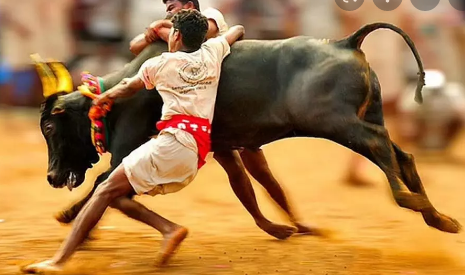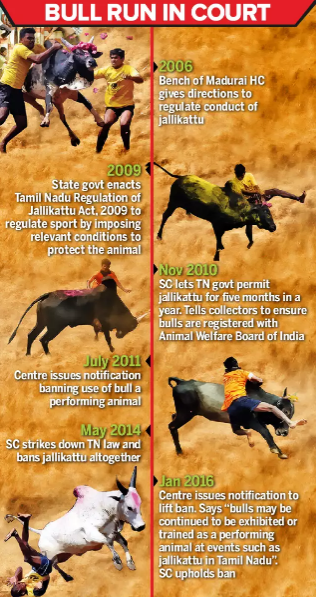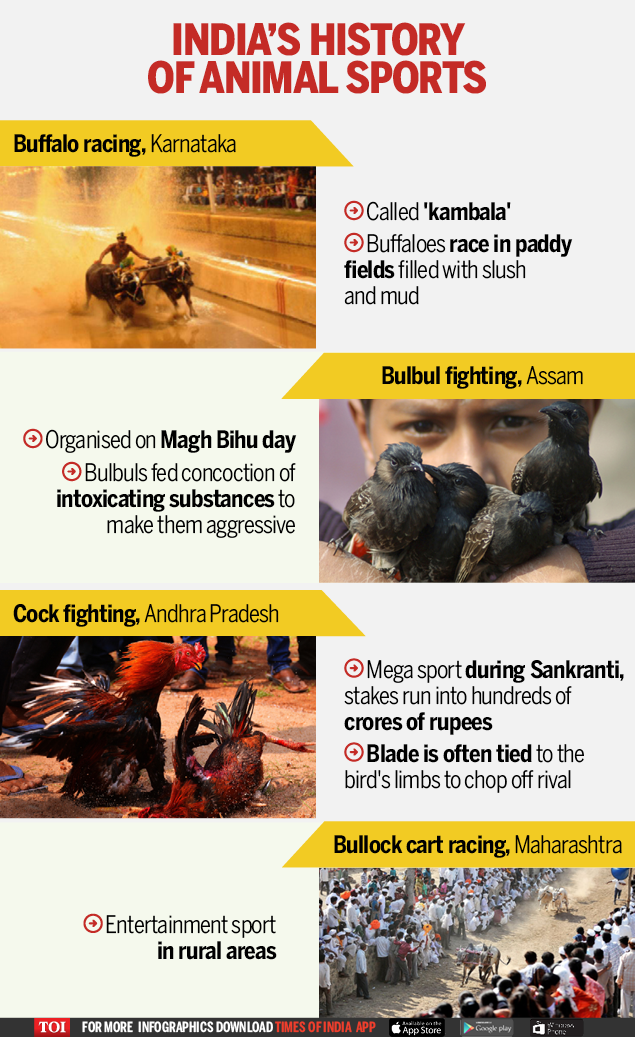Description

Disclaimer: Copyright infringement not intended.
Context
- Jallikattu banned in Vellore, nearby districts in Tamil Nadu ahead of Pongal.
About Jallikattu
- Jallikattu is a bull-taming sport that has traditionally been part of the festival of Pongal in Tamil Nadu.
- The sport involves releasing a running bull into a crowd of people.
- Participants attempt to grab the bull's hump and ride it for as long as possible, in an attempt to stop it.
- The elite Jallikattu breeds test the strength and guile of farm hands in especially-constructed arenas.
- It is a violent sport, and there is only one winner, man or bull.
History
- Jallikattu has been known to be practiced during the Tamil classical period (400-100 BC).
- It was common among the Ayar people who lived in the ‘Mullai’ geographical division of the ancient Tamil country.
- Later, it became a platform for display of bravery and prize money was introduced for participation encouragement.
- A seal from the Indus Valley Civilization depicting the practice is preserved in the National Museum, New Delhi.
- A cave painting in white kaolin discovered near Madurai depicting a lone man trying to control a bull is estimated to be about 1,500 years old.
The controversy over Jallikattu
- In recent times, Jallikattu has attracted protests from animal rights organizations like People for the Ethical Treatment of Animals (PETA) and Federation of India Animal Protection Agencies (FIAPA).
- Over 200 people - both tamers and spectators - have lost their lives in the last two decades.

Arguments against such games
- SC Verdict: In 2014, the Supreme Court had ruled that the Prevention of Cruelty to Animals Act, 1960, “over-shadows or overrides the so-called tradition and culture”.
- Not sanctioned by scriptures: The court drew upon Upanishadic wisdom and advised Parliament to “elevate rights of animals to that of constitutional rights so as to protect their dignity and honour”.
- Case of torture: Documentation done by the Animal Welfare Board of India, a statutory body under the Centre, and animal rights groups like PETA, that served as evidence that in many such animal games like Jallikattu animals were physically and mentally tortured.
- Loss of lives: Hundreds of people have lost their lives in the last two decades.
The case for culture and tradition
- Cultural Representation: There exists tangible evidence to show that this battle between man and beast is a cultural representation.
- Agrarian Economy: The political economy of such games is about showcasing the quality of cattle, the breeding skills of cattle rearers, the centrality of cattle in an agrarian economy, and the power and pride they bring to farmers.
- Agrarian Culture: Such games are a cultural manifestation of this political economy. As a tradition, it links an agrarian people to the elemental aspect of their vocation.
- Symbol of Tamil Culture: Jallikattu’s linkages with Pongal has lifted it above its regional and community origins and transformed it into a symbol of Tamil culture and pride.
- Shapes Political Discourse: Pride in Tamil culture is central to Dravidian nationalism, which continues to shape the political discourse in Tamil Nadu.
Final Thoughts
- Although there are systems in place to check treatment of the bulls and ensure safety of participants and spectators, animal cruelty still continues and people continue to lose their lives.
- There needs to be a comprehensive regulatory framework in place with zero implementation gaps to check treatment of animals and ensure safety of participants and spectators.
|
About Kambala
Kambala is an annual buffalo race held in Karnataka. Traditionally, it is sponsored by local Tuluva landlords and households in the coastal districts of Udupi of Karnataka and Kasaragod of Kerala. This region is collectively known as Tulu Nadu. The Kambala season generally starts in November and lasts until March.
Traditional Kambala was non-competitive, and the buffalo pair was run one by one. In modern Kambala, the contest takes place between two pairs of buffaloes. There is also a ritualistic aspect, as farmers race their buffaloes to give thanks for protecting them from diseases.
|

https://epaper.thehindu.com/Home/ShareArticle?OrgId=GID9CLN0M.1&imageview=0
















